| 26 June |
• yesterday • tomorrow |
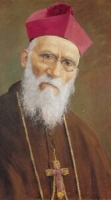
• Andrea of Fiumicello
• Andrew Longhin
• Andrew of Campodarsego
• Bishop of the Catechism
• Hyacinth Bonaventure Longhin
The only son of Matthew and Judith Marin, poor and pious tenant farmers. He early felt a call to the priesthood. Against the wishes of his father, he became a Capuchin novice, taking the name Andrew of Campodarsego at Bassano del Grappa, Venice on 27 August 1879 at age 16. He studied at Padua and Venice in Italy, made his solemn profession on 4 October 1883, and was ordained on 19 June 1886.
Spiritual director for young religious for 18 years. Taught at the Capuchin seminary at Udine, Italy. Director of Capuchin teachers at Padua in 1889. Director of theology students in Venice in 1891. Capuchin Provincial Minister at Venice on 18 April 1902 where he came to the attention of the future Pope Saint Pius X. Bishop of Treviso, Italy, consecrated in Rome, Italy on 17 April 1904, a see he would hold for 32 years.
He entered the see with reform in mind, and spent five years travelling from parish to parish, preaching and becoming close to his parishioners and clergy, many of whom resisted his reforming efforts. He reformed the diocesan seminary, improving the quality of teaching and spiritual formation. He promoted spiritual retreats for the clergy, and worked with lay groups, especially those involved in the Catholic social movement, supporting the right for workers to organize. He encouraged religious orders to work in his diocese; male institutes went from 7 to 12, women's from 10 to 24 during his bishopric, and these included houses of Franciscans, Passionists, Salesians, Carmelites, Somaschi Fathers, Camillians, and Missionary Oblates of Mary Immaculate. Friend of Saint Leopold Mandic.
During the air and ground attacks that destroyed Treviso in World War I, Bishop Andrew stayed at his post, and told his priests that they could leave if they were ministering to refugees. Andrew became the center of work in the community, organizing help for soldiers, the wounded, the sick and the poor. Because he refused to ally himself with any of the war parties, he was convicted of defeatism, and was imprisoned with several of his priests. Upon his release, he resumed his work of ministering in his diocese, and rebuilding the city and the 47 parishes that had been destroyed, and was eventually awarded the Cross of Merit war decoration.
During the post-war years, Bishop Andrew worked with many lay groups to help keep the Catholic social movement as Catholic as possible. He insisted on non-violence and loyalty to the Church, which put him at odds with the growing Fascist movement. In 1920 he supported Leghe Bianche, a Christian union movement. Pope Pius X chose him as Apostolic Visitor to Padua in 1923 and then Udine in 1927 to 1928 in order to return unity between the priests and bishops of those dioceses.
22 November 1863 in Fiumicello di Campodarsego, province and diocese of Padua, Italy as Hyacinth Bonaventure Longhin
• Friday 26 June 1936 in Treviso, Italy of natural causes following an eight-month illness
• interred in the cathedral of Treviso
• 10:00 am Sunday 20 October 2002 by Pope John Paul II
• his Cause began on 21 April 1964
• his beatification miracle involved the 1964 cure of Dino Stella from diffuse peritonitis
Today families, parishes, the nation, the world are in need of saints. - Blessed Andrea
With joy and edification I see in him a copy of the Good Shepherd in the Gospel, very, very true to the original. - Servant of God, Pietro Cardinal La Fontaine, 1929
https://catholicsaints.info/blessed-andrea-giacinto-longhin/
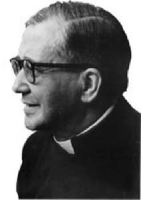
Josemaria Escriva de Balaguer
One of six children born to Jose and Dolores Escriva; three of his siblings died in infancy. His father was a small businessman, and when his business failed in 1915, the family moved to Logroño, Spain. As a young man, Josemaria saw the bare footprints left in the snow by a monk; the sight moved him, and kindled a desire for religious vocation. He studied for the priesthood in Logroño and Zaragoza, Spain. His father died in 1924, and Josemaria had to simultaneously support the family while studying. Ordained in Zaragoza on 28 March 1925.
Assigned for a while to a rural parish, and then in Zaragoza. Moved to Madrid, Spain in 1927 to study law. Following a profound spiritual retreat, Josemaria founded Opus Dei in Madrid on 2 October 1928, opening a new way for the faithful to sanctify themselves in the midst of the world through their work and fulfillment of their personal, family and social duties. The next few years were spent studying at the University of Madrid, teaching to support his mother and siblings, ministering to the poor and sick, and working to build the foundation of Opus Dei.
Religious persecution in the Spanish Civil War forced Josemaria into hiding, and he ministered covertly to his parishioners. He escaped across the Pyrenees to Burgos, Spain. At the end of the war in 1939, he returned to his studies in Madrid. Doctor of law. Retreat master for laity, priests, and religious.
On 14 February 1943 he founded the Priestly Society of the Holy Cross, united to Opus Dei. Josemaria moved to Rome, Italy in 1946, and earned a doctorate in theology from the Lateran University. Consultor to two Vatican Congregations. Honorary member of the Pontifical Academy of Theology. Named a prelate of honor by Pope Pius XII.
Opus Dei received the approval of the Holy See on 16 June 1950. Josemaria travelled frequently throughout Europe and Latin America to work for the growth of Opus Dei, and by the time of his death, it had spread to five continents with over 60,000 members of 80 nationalities, and today has over 80,000 members, most laymen.
9 January 1902 at Barbastro, Spain
• 26 June 1975 of natural causes in his office in Rome, Italy
• interred at Prelatic Church of Our Lady of Peace at Viale Bruno Buozzi 75, Rome, Italy
• 17 May 1992 by Pope John Paul II
• the beatification miracle involved the cure in 1976 of Carmelite Sister Concepcion Boullon Rubio from the nearly-fatal cancerous form of lipomatosis following prayers by her family for the intercession of Father Josemaria
• 6 October 2002 by Pope John Paul II
• the canonization miracle involved saving a surgeon's hands from a career-ending disease
With supernatural intuition, Blessed Josemaria untiringly preached the universal call to holiness and apostolate. Christ calls everyone to become holy in the realities of everyday life. Hence work too is a means of personal holiness and apostolate, when it is done in union with Jesus Christ. - Pope John Paul II in his homily at the beatification of Saint Josemaria
https://catholicsaints.info/saint-josemaria-escriva/
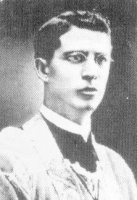
21 May as one of the Martyrs of the Mexican Revolution
Born to a fervently Catholic family, the son of Antonio Robles and Petronila Hurtado. Entered the seminary of Guadalajara, Mexico at age 12. Ordained on 22 March 1913 at age 25 at Guadalajara.
Consecrated to the Sacred Eucharistic Heart of Jesus, and in 1918 founded the Congregation of Victims of the Eucharistic Heart of Jesus (Hermanas del Corazón de Jesús Sacramentado) at Nochistlan, Zacatecas, Mexico. The congregation was dedicated to pastoral health and education, assisting orphanages, and conducting missions. Today it is known as the Sisters of the Sacred Heart of Jesus.
Parish priest in Tocolotlan in 1920. During the persecutions of the Mexican Revolution, priests were outlawed; parishioners urged Father Jose to run, but he could not abandon his people. He was arrested on 25 June 1927 for presiding at Mass in private homes; he was at a make-shift altar when soldiers broke in to grab him. Hanged from an oak tree the next day, after having blessed and forgiven his captors; he kissed and blessed the rope, and put around his own neck so no executioners would not be guilty of the murder. One of the Martyrs of the Cristera War.
3 May 1888 at Mascota, Jalisco, Mexico
• hanged on 26 June 1927 at Quila, Jalisco, Mexico
• relics at the church at Tecolotlan
21 May 2000 by Pope John Paul II during the Jubilee of Mexico
https://catholicsaints.info/saint-jose-maria-robles-hurtado/
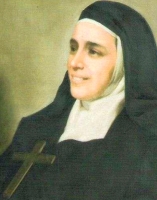
• Pinella (childhood nickname in her family)
• Sister Maria Giuseppina of Jesus Crucified
• Marie-Joséphine de Jésus crucifié
Born to the Italian nobility, Giuseppina was known as a pious girl with great care for the poor, a devotion to Mary and the Eucharist, and for praying her rosary whenever she had a chance. She developed the heart condition angina pectoris in 1912, later contracted spinal tuberculosis, and was eventually confined to a wheelchair. Against her family’s objections, she joined the Carmelites on 10 March 1918. Following a pair of visions of Saint Francis Xavier, Giuseppina was miraculously cured on 26 June 1922; word leaked out and people from all over the region came to learn from her. In 1932 she received approval from Pope Pius XI to found a cloistered house of Discalced Carmelites; she took the name Sister Maria Giuseppina of Jesus Crucified and made her solemn profession on 6 August 1932. Sub-prioress in 1934. In 1943 she developed multiple sclerosis, began to lose her sight, and in 1944 was again confined to a wheelchair. As intructed by her spiritual director, she began writing an autobiography and spiritual journal for the benefit of the sisters who might learn from her. Chosen vicar in early 1945, and then prioress on 29 September 1945, a position she held the rest of her life.
18 February 1894 in Italy
14 March 1948 in Naples, Italy of natural causes
• 1 June 2008 by Pope Benedict XVI
• beatification recognition celebrated at the Cathedral in Naples, Italy presided by Cardinal Crescenzio Sepe
https://catholicsaints.info/blessed-giuseppina-catanea/
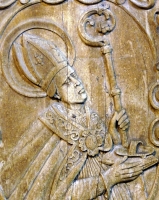
Vigilio
Roman patrician, son of Theodosius and Maxentia. Brother of Saint Claudian and Saint Magorian. Studied at Athens, Greece where he developed a reputation for learning and sanctity. Friend of Saint John Chrysostom. Settled in the region of Trent, Italy in 380. Chosen bishop of Trent by the faithful of the area. Worked to help the poor, and opposed usury. Friend of Saint Ambrose of Milan. Nearly ended paganism in his diocese, and worked to bring Arians back to orthodox Christianity. Missionary to the areas surrounding his diocese, founding 30 parishes. Worked with Saint Sisinnius, Saint Martyrius and Saint Alexander about whom he wrote De Martyrio SS. Sisinnii, Martyrii et Alexandri. Killed when he overturned a statue of Saturn in the one the few remaining enclaves of such pagan worship. Pope Benedict XIV called Vigilius the first martyr canonized by a pope.
c.353
• stoned to death on 26 June 405 near Lake Garda in the Val di Rendena
• buried in Trent, Italy
• diocese of Bolzano-Bressanone, Italy
• Trent, Italy
• Tyrol, Italy
bishop holding a shoe
https://catholicsaints.info/saint-vigilius-of-trent/
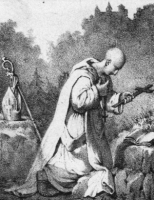
• Anthelm de Chignin
• Anthelme, Anthelmus
Born to the nobility. Priest. Provost of a cathedral chapter. He got caught up in Church politics, and sought ecclesiastical positions to increase his power and authority rather than ability to serve. A visit to the Carthusians at Portes changed his view of his vocation, and he felt drawn to the monastic life. At age thirty, Anthelm renounced his offices, and retired to the Carthusian monastery. Within two years he was prior of the mother house at Grande Chartreuse; the monastery flourished and increased in both numbers and holiness. During the Schism of 1158 he supported Pope Alexander II, earning him the enmity of Emperor Frederick Barbarossa. Bishop of Belley, France; he was so beloved that the town was briefly known as Anthelmopolis. Several years later, Anthelm retired to solitude at Portes. Within months he was asked to serve as prior of the community there. Two years later Anthelm retired to Grande Chartreuse, but was recalled to help mend a schism between King Henry II and Thomas a Becket in England.
1105 at Savoy
1178 in France
https://catholicsaints.info/saint-anthelm-of-belley/
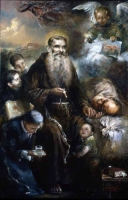
• Ya'Qub of Ghazir
• Yaaqub El-Haddad
Third of five children. Teacher in Egypt when he felt a call to religious life. Franciscan Capuchin monk, making his perpetual vows in 1898. Ordained in 1901, he was assigned to the Bab Idriss monastery in Beirut, Lebanon. Working tirelessly for the physical and moral improvement of the local people, he founded and built churches, schools, hospitals and orphanages. Founded the Franciscan Sisters of the Cross in 1930 to care for the elderly, the disabled, the mentally handicapped and the incurable who had been abandoned by families and authorities. Left 24 volumes of transcribed sermons given in Lebanon, Palestine, Iran and Syria.
1 February 1875 in Ghazir, Kesrwan, Jabal Lubnan, Lebanon
26 June 1954 in Beirut, Lebanon of natural causes while holding a cross
22 June 2008 by Pope John Paul II
https://catholicsaints.info/blessed-khalil-al-haddad/
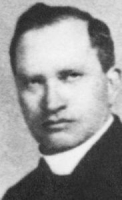
Andrij, Andriy
27 June as one of the Martyrs Killed Under Communist Regimes in Eastern Europe
Greek Catholic. Studied at universities in Lviv, Ukraine, and Innsbruck, Austria. Doctor of theology in 1914, receiving his degree from the University of Innsbruck. Ordained in 1914. Teacher at the Lviv Theological Academy in 1928. Pastor of the Archeparchy of Lviv for the Ukrainians at Sykhiv. Martyred by retreating Soviet soldiers who passed through his village.
20 September 1887 at Mykolayiv, Lviv District, Ukraine
murdered by Soviet soldiers on 26 June 1941 at Sykhiv, Ukraine
27 June 2001 by Pope John Paul II in Ukraine
https://catholicsaints.info/blessed-andrii-ischak/
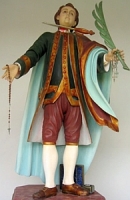
• Pelagius the Martyr
• Paio, Pelayo
Left with Moors at age 10 as a hostage for his captured Christian uncle. Three years later, when Pelagius had not been ransomed, he was offered his freedom and a reward if he would convert to Islam and denounce Christianity; he declined. Martyred at age 13.
c.912 at Asturias, Spain
• tortured to death in 925
• relics moved to Leon, Spain in 967
• relics moved to Oviedo, Spain in 985
• abandoned people
• torture victims
• Castro Urdiales, Spain
• Torreira, Portugal
https://catholicsaints.info/saint-pelagius-of-oviedo/
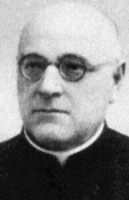
Nicholas Konrad
Greek Catholic. Studied philosophy and theology at Rome, Italy. Ordained in 1899. Taught in high schools in Berezhony and Tereboblya. Taught at the Theological Academy in 1930. Parish priest at Stradch. Pastor of the Archeparchy of Lviv for the Ukrainians. Martyr.
16 May 1876 at Strusiv, Ternopil District, Ukraine
tortured and murdered by NKVD agents on 26 June 1941 in the forest outside Stradch, Yavoriv, L'vivs'ka oblast', Ukraine
27 June 2001 by Pope John Paul II at Ukraine
https://catholicsaints.info/blessed-mykola-konrad/
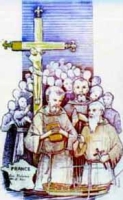
Priest in the diocese of Limoges, France. Imprisoned on a ship in the harbor of Rochefort, France and left to die during the anti-Catholic persecutions of the French Revolution. One of the Martyrs of the Hulks of Rochefort.
3 January 1747 in Limoges, Haute-Vienne, France
26 June 1794 aboard the prison ship Deux-Associés, in Rochefort, Charente-Maritime, France
1 October 1995 by Pope John Paul II
https://catholicsaints.info/blessed-raymond-petiniaud-de-jourgnac/
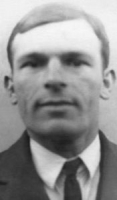
Greek Catholic. Layman, married and a father. Cantor and choir director at Stradch. Martyred with Father Nicholas Konrad while returning from a sick call.
17 July 1906 at Stradch, Yavoriv, L'vivs'ka oblast', Ukraine
tortured and murdered by NKVD agents on 26 June 1941 in the forest outside Stradch, Yavoriv, L'vivs'ka oblast', Ukraine
27 June 2001 by Pope John Paul II at Ukraine
https://catholicsaints.info/blessed-volodymyr-ivanovych-pryima/
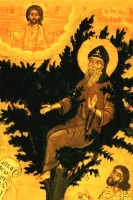
• David the Dendrite
• David the Tree-Dweller
From his youth, David was known for his contamplative, prayerful personal piety. Hermit outside Thessalonica for 70 years, including three years living in an almond tree.
5th-century Mesopotamia
• 540 of natural causes
• relics translated to Pavia, Italy in 1054
https://catholicsaints.info/saint-david-of-thessalonica/
Giuseppe, Joseph, Ruose
Lifelong layman in the apostolic vicariate of Southeastern Zhili, China. Physician. Catechist. During the anti-Western, anti-Christian persecutions of the Boxer Rebellion, most of Joseph's family renounced their Christianity; Joseph refused to. Martyr.
c.1840 in Qianshenzhuang, Dongguang Co., Hebei, China
26 June 1900 in Wangla, Dongguang Co., Hebei, China
1 October 2000 by Pope John Paul II
https://catholicsaints.info/saint-iosephus-ma-taishun/
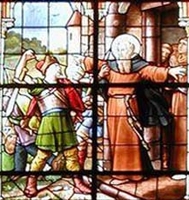
Masenzio, Massenzio, Maixent
Spiritual student of Saint Severus of Poitiers. Monk at a monastery in Poitou, France, a place now Saint-Maixent in his honour; he eventually served as abbot. He was highly esteemed by the local laity whom he sheltered during invasions. Known as a miracle worker.
c.448 in Agde, France
518 of natural causes
https://catholicsaints.info/saint-maxentius-of-poitou/
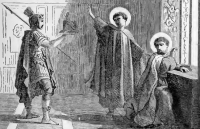
Servant of Constantia, daughter of Constantine. He refused to join the household of Julian the Apostate when he became emperor, and was secretly martyred in his own home. His name is listed in the "Communicantes" in the Canon of the Mass. A basilica in Rome, Italy is named for him.
Roman
• beheaded
• interred under the basilica of Saints John and Paul
https://catholicsaints.info/saint-john-of-rome-26-june/

Servant of Constantia, daughter of Constantine. He refused to join the household of Julian the Apostate when he became emperor, and was secretly martyred in his own home. His name is listed in the "Communicantes" in the Canon of the Mass. A basilica in Rome, Italy is named for him.
Roman
• beheaded
• interred under the basilica of Saints John and Paul
https://catholicsaints.info/saint-paul-of-rome-26-june/
Babolin, Badolenus, Papolenus, Papolin
Travelling missionary bishop in 7th-century Netherlands. Close friend of Saint Remaclus. In later life he retired to lives as a prayerful monk at the monastery of Stavelot-Malmédy (in modern Belgium).
• c.700 at the monastery of Stavelot-Malmédy, Belgium of natural causes
• buried at the abbey church at Stavelot-Malmédy
https://catholicsaints.info/saint-babolenus-of-stavelot-malmedy/
Uncle of Saint Pelagius of Cordova. Benedictine monk. Bishop of Tuy, Spain. Founded the abbey at Lubrugia, Spanish Galatia in 915. Captured by Moors and imprisoned in Cordoba, Spain with Pelagius for his faith. He was later freed, but Pelagius retained as a hostage for his behavior. Placed in a position where he could not actively promote the faith, he resigned his bishopric, and retired to live as a monk at Ribas del Sil.
at Tuy, Spain
c.942 of natural causes
https://catholicsaints.info/saint-hermogius/
• Bartholomew of Laon
• Bartholomew of Foigny
Bishop of Laon, France from 1113 to 1151. Helped Saint Norbert of Xanten with the founding of the Premonstratensians. Built the Cistercian abbey at Foigny, France in 1121; late in life he retired from his bishopric to spend his remaining years as a prayerful monk.
1157 of natural causes
https://catholicsaints.info/blessed-bartholomew-de-vir/
Born a princess, the sister of King Osric of Hwicce (an area in modern Worcestershire, England). Benedictine nun, consecrated in 710 by Saint Egwin of Worcester. Abbess of Saint Peter’s Abbey in Gloucester, England where she served about 20 years.
late 7th century England
26 June 735 in Gloucester, England of natural causes
https://catholicsaints.info/saint-edburga-of-gloucester/
Mercedarian friar at the convent of Montpellier, France. Sent to Africa to ransom Christians who had been enslaved by Muslims, he was replaced one of the them and served as a slave for 10 years in Algeria before he could be ransomed back himself, never losing his faith.
Mercedarian convent at Montpellier, France of natural causes
https://catholicsaints.info/blessed-sebastian-de-burgherre/

Pazanne, Peccina, Pecinne, Pexine, Pezhenn, Pitère, Piterre, Pithère
Pezenne fled to France from Spain during the persecutions of Diocletian in the early 4th century. In the area of Niort, France she helped Saint Macrine found a small monastery.
late 3rd century Spain
https://catholicsaints.info/saint-pezenne/
Terentianus
Layman soldier and commander of an imperial Roman bodyguard during the reign of Julian the Apostate. Father of at least one son. Witness to the death sentencing of Saint John and Saint Paul. Convert. Martyr. Some sources say that his son was martyred with him.
Rome, Italy
https://catholicsaints.info/saint-terence-of-rome/
Albinus of Cologne
Martyr.
• in Rome, Italy, date unknown
• relics brought to the church of Saint Pantaleon in Cologne, Germany c.990 by Empress Theofano
• relics re-enshrined in a new reliquary in 1186 and moved to the treasury of the cathedral in Cologne
https://catholicsaints.info/saint-albinus-of-rome/
Pecinna, Pezaine
Holy virgin who, with her sisters Macrina and Columba, founded a convent in Poitiers, France.
Spain
c.726 at Sainte-Pezaine, France while fleeing a thief
https://catholicsaints.info/saint-perseveranda-of-poitiers/
Salvio
Bishop near Angouleme, France. Missionary to the Flemish in Valenciennes (in modern France) with Saint Superius. Murdered by a greedy local noble who opposed the work. Martyr.
c.768 at Valenciennes (in modern France)
https://catholicsaints.info/saint-salvius/
Babolen
Monk at Luxeuil Abbey, Burgundy (in modern France). Abbot of Saint Peter's Abbey (later known as Saint Maur-des-Fossés) in northern France.
c.677
https://catholicsaints.info/saint-barbolenus-of-fosses/
Deacon to Saint Paulinus of Nola. Archpriest of Nola, Italy. Bishop of Nola.
• 26 June 473 of natural causes
• buried in Nola, Italy
• relics translated to Benevento, Italy in 839
https://catholicsaints.info/saint-deodatus-of-nola/
Bishop of the Goths in South Russia. Noted defender of religious images, opposing the iconoclasts. Driven from his see by invading Khazars, and never able to return.
c.800 of natural causes
https://catholicsaints.info/saint-john-of-the-goths/
Missionary to the Flemish in Valenciennes (in modern France) with Saint Salvius. Murdered by a greedy local noble who opposed the work. Martyr.
c.768 at Valenciennes (in modern France)
https://catholicsaints.info/saint-superius/
Archbishop from Bulgaria. Missionary to Russia. Built a monastery in Novgorod.
1180 in Kiev, Russia of natural causes
https://catholicsaints.info/saint-dionysius-of-bulgaria/
Eighth century hermit in Netherlands where he was known for his charity and endless help to the local people.
Ireland
https://catholicsaints.info/saint-corbican/
Medicus
Martyr.
https://catholicsaints.info/saint-medico-of-otricoli/
Martyr.
in Rome, Italy, date unknown
https://catholicsaints.info/saint-acteie-of-rome/
Soadbar
Bishop in Ireland.
https://catholicsaints.info/saint-soadbair/
Four Christians who were martyred together - Agapitus, Emerita, Felix and Gaudentius.
unknown location in Africa, date unknown
https://catholicsaints.info/martyrs-of-africa-26-june/
Three Christians who were martyred together, but we really know little more that the names - Agatho, Diogenes and Luceja.
Alexandria, Egypt, date unknown
https://catholicsaints.info/martyrs-of-alexandria-26-june/
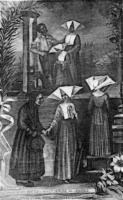
Four Daughters of Charity of Saint Vincent de Paul nuns at Arras, France. Imprisoned together in 1792 and executed together two years later in the anti-Catholic excesses of the French Revolution.
• Jeanne Gerard
• Marie-Françoise Lanel
• Marie-Madeleine Fontaine
• Thérèse-Madeleine Fantou
guillotined 26 June 1794 at Cambrai, Nord, France
June 1920 by Pope Benedict XV
https://catholicsaints.info/martyrs-of-cambrai-26-june/
• Our Lady of Longing
• Our Lady of Trompone
• Mary Josephine of Jesus Crucified
• Rodolfo of Gubbio
CatholicSaints.Info Portable Edition